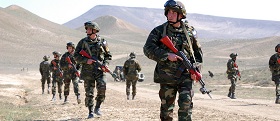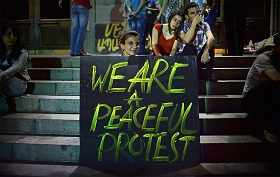The flare-up between Russia and Turkey following the incident with the downed Russian military jet [1] has adversely affected the dynamics of the Middle East crisis. The tension that has arisen between the two countries can have far-reaching consequences for the Caucasus region.
The situation is being aggravated by the ongoing escalation of tensions along the delimitation line in Nagorno-Karabakh. In early December 2015, the Azerbaijani side began using tanks, which it had never done since entering into a truce in May 1994), having previously used howitzers, mortars and multiple artillery rocket systems. Given the exacerbation of relations between Moscow and Ankara, the Karabakh dimension of the Russian-Turkish crisis is assuming a new significance.
Armenia amid the Russian-Turkish crisis
Relations between Turkey and Armenia are already tense. They are burdened by many historical problems, the genocide of Armenians in the Ottoman Empire during World War I above all. The countries have no diplomatic relations. Turkey openly supports Azerbaijan in the Karabakh conflict and maintains a transport and communication blockade against Armenia, which it imposed in the early 1990s.
Even before the incident with the Su-24 bomber, the Caucasus region was within the orbit of tensions between Russia and Turkey, exacerbated by differences in Ankara’s and Moscow's approaches to developments in Syria and Iraq. This is particularly true of Armenia. It is the only country in the region that neighbors the Middle East, is a strategic ally of Russia and a member of the CSTO, which, in accordance with bilateral and multilateral agreements, is obliged to provide assistance in the event of external aggression. Russia’s 102nd Military Base, the closest to the Syrian conflict zone, is stationed on the territory of Armenia, and includes, among other things, an air component (Armenian Erebuni Airport is home to a squadron of Mikoyan MiG-29 fighters).
The Syrian campaign and the growing Russia-Turkey stand-off have already directly affected Armenia in military terms. In early October 2015, Ankara rather nervously reacted to a breach of its airspace by Russian fighter jets on combat missions in northern Syria, and on October 6 and 7, Turkish military helicopters under the pretense of an accident violated the Armenian border, which was guarded by Russian border guards.
Amidst the dramatic escalation of tensions in relations with Ankara, many experts have been tempted to interpret the above facts as part of an intensified strengthening of Russia’s military presence in Armenia which is directed against Turkey. In reality, however, these military-political measures had been planned long before. The dramatic developments in the Middle East and the crisis in Russian-Turkish relations only accelerated the modernization of the Russian military presence in Armenia and strengthened cooperation between the two countries in the defense sector. A significant strengthening of the Russian military presence in Armenia is so far unlikely, provided, of course, that there is no force majeure clash of arms between Russia and Turkey. Armenia can hardly be suspected of leaning towards Turkey, especially in the latter’s conflict with Russia. The Armenian leadership has not hesitated to make several statements condemning Ankara’s actions.
During the CSTO summit in Moscow in late December 2015, Armenian President Serzh Sargsyan [2] called on all members of the Organization to agree on a common position on the incident with the Russian military jet and on the escalation of the Karabakh conflict zone. However, in both cases, the reaction of other CSTO member states, particularly the Central Asian ones, was a far cry from Moscow’s and Yerevan’s position.
Thus, Armenia appeared to be virtually the only CSTO country to publicly support the position of Russia against Turkey. This notwithstanding, Yerevan is not at all interested in a further escalation of the conflict between Moscow and Ankara. Any open confrontation can turn Armenia’s borders (the only place where Russian and Turkish border guards are officially stationed face to face) into a field for their power struggle. At that, the crisis in relations with Turkey is quite likely to bring the positions of Yerevan and Moscow on a number of substantive issues of the regional policy closer to one another. And this is true for not just for relations between Moscow and Ankara (Armenia has traditionally kept a wary eye on the post-Soviet dynamics of Russian-Turkish cooperation). It is not improbable that the Russian-Turkish crisis will affect Russia’s position in holding up the precarious balance in its relationship with Armenia and Azerbaijan regarding the Karabakh conflict. Moscow is unlikely to harbor any illusions about the sympathies of the Azerbaijani authorities and the public in relation to the crisis between Russia and Turkey.
The mounting Russian-Turkish crisis has had a direct impact on the Armenian internal political situation, causing anxiety among politicians and the public at large. The polarization of positions of proponents of various vectors of Armenia's foreign policy orientation is growing. The public debate about the country's stance towards the crisis that is unfolding between Moscow and Ankara is remarkable for its wide range of opinions. Nevertheless, Yerevan’s official position on the Karabakh issue remains steadfast.
Azerbaijan: Hobson’s choice?
There is little doubt that the Russian-Turkish crisis has created no less a problem for Azerbaijan. Turkey and Azerbaijan appear to be the closest Turkic states in ethnocultural and linguistic terms. Traditionally Turkish officials, just as they had done in previous decades, have made statements in support of Baku’s position in the Karabakh conflict. It is precisely this that has led many observers to interpret the dramatic deterioration of the situation in Nagorno-Karabakh, including the unprecedented December aggravation of tensions on the delimitation line between the Azerbaijani army and the troops of unrecognized Nagorno-Karabakh Republic, as a result of direct influence that Ankara has exerted on Baku.
However, despite its undisguised pro-Turkish leanings, Azerbaijan most likely will be reluctant to openly support Turkey in the latter’s confrontation with Russia, which has impressive enough political and economic leverage on Baku. At that, Azerbaijan seems unlikely to resume large-scale hostilities in Nagorno-Karabakh today, when the probability of Moscow’s open involvement in the conflict on the Armenian side is greater than ever. Russia is demonstrating a determination to defend its interests in the faraway Middle East and the Eastern Mediterranean, which is thousands kilometers away, so any renewal of the armed conflict behind its back in its near-abroad countries will hardly be ignored. A new round of hostilities in Nagorno-Karabakh can be perceived by Moscow as a direct result of Turkey’s intrigues, even if Turkey, in fact, has nothing to do with it.
At the same time, Russia’s open military support for Armenia due to its clear-cut obligations in the field of security may well be a welcome opportunity for the Kremlin to “punish” Erdogan and take revenge for the Russian jet that was shot down by the Turks. No wonder that amidst the Russian-Turkish crisis military-technical cooperation between Armenia and Russia has intensified. An agreement to grant Armenia a $200 million loan for the purchase of advanced Russian weapons gave new momentum to this cooperation. In early February 2016, Moscow published a list of weapons that it intends to sell to Armenia. These agreements do not cover the full range of the Armenian-Russian military-technical cooperation (other arms supplies under other contracts are expected as well) and stabilize the military-technical balance of the parties to the Karabakh conflict. It is hoped that Baku is fully aware of all the dangers inherent in “unfreezing” the conflict at such an explosive time.
Nevertheless, there are a number of additional factors that may escalate the conflict in Nagorno-Karabakh. These factors relate not much to the dynamics of the Russian-Turkish relations, as to deterioration of the financial, economic and socio-political situation in Azerbaijan. This process accelerated at the end of 2015 and was caused by a continued decline in oil prices for the second year running, while the sale of oil (together with gas) making up the lion’s share of Azerbaijan’s direct and indirect revenues (about 90 percent of Azerbaijan’s exports). The official foreign exchange reserves of the Central Bank of Azerbaijan, which in January 2015 amounted to $15.052 billion, declined by $5 billion within a year. The continued rapid fall of the manat is fraught with negative consequences for internal political stability in Azerbaijan.
No matter how banal and simplistic it may sound, the ongoing escalation of unrest on the front line appears to be a very handy tool for the Azerbaijani authorities to distract public attention from the domestic problems. However, the worsened financial and economic situation in Azerbaijan was one of the leading causes, but not the one and only reason for the intensification of the Karabakh conflict. The latter is also due to a quite rational and long-term strategy of the country’s leadership. Baku constantly uses escalation on the front line to exert pressure on the Armenian side and the mediators in the negotiation process, the OSCE Minsk Group (Russia, France, USA) in particular. The purpose of Azerbaijan is to gain one-sided concessions, and at the same time to give weight to its threats of resuming a full-scale war.
Against this backdrop, the worsening of relations between Russia and Turkey does exacerbate the regional situation around the Karabakh conflict, while creating additional risks and narrowing the scope of possible political maneuvering for Baku. However, the background of the Russian-Turkish crisis is unlikely to serve as an accelerator in the near future and contribute to the resumption of large-scale hostilities in Nagorno-Karabakh.
* * *
Regardless of the catastrophic deterioration of the situation in the Middle East and surrounding regions, the main military and political factors that support a relative truce and deter Azerbaijan from resuming large-scale hostilities in Nagorno-Karabakh continue to have an effect.
First of all, the matter at hand is the relative balance of the military potential of the conflicting parties, as well as the agreed position of the OSCE Minsk Group, which has not been affected by the tensions between Russia and the West. Therefore, should Azerbaijan resume large-scale hostilities, it will fail to win a swift victory, while the losses in case of a probable defeat (amidst an unambiguously negative and coordinated reaction from the international community) will be disastrous. However, this does not eliminate the possibility of escalating border clashes, but the prospects for the unleashing of a full-scale war seem to be virtually brought to naught.
Alongside this, the resumption of hostilities in Nagorno-Karabakh is unlikely to align with the interests of the parties to the Russian-Turkish crisis. Russia, being involved in the conflict in Ukraine and Syria and content on the whole with the current status quo in the Caucasus region, has no interest in triggering another conflict on its southern border. It should also be noted that Russia has obligations to Armenia in the sphere of mutual defense and security.
As for Turkey, despite the continued social euphoria from R. Erdogan’s actions, Ankara rather seeks to minimize the damage caused by the conflict with Russia in the wake of the Su-24 bomber incident, the imposition of sanctions by Russia and countermeasures. A further escalation of the Russian-Turkish confrontation appears to be more preferable for Turkey on its southern borders. Ankara perceives them as its own “near-abroad,” which is geographically and strategically more important and useful for keeping its national interests. In contrast to Syria and Iraq, the Caucasus region offers Russia a better military-strategic starting environment and more motivation to respond.
1. On November 24, 2015 a Turkish Air Force fighter F-16 jet shot down a Russian Sukhoi Su-24M bomber aircraft, carrying out combat missions in the sky over northern Syria.
2. Armenia is currently presiding over the CSTO.







